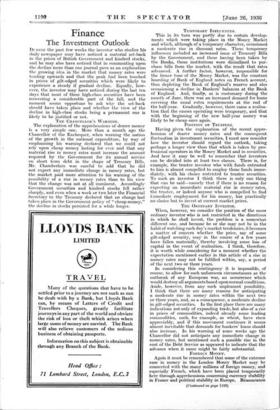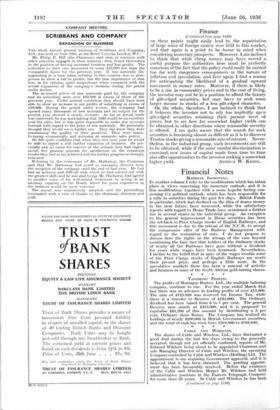The Investment Outlook
Finance
DURING the past few weeks the investor who studies his daily newspaper may have noticed a material set-back in the prices of British Government and kindred stocks, and he may also have noticed that in commenting upon the decline more than one journal gave as an explanation the growing idea in the market that money rates were tending upwards and that the peak had been touched in prices of gilt-edged securities which were likely to experience a steady if gradual decline. Equally, how- ever, the investor may have noticed during the last ten days that most of these high-class securities have been recovering a considerable part of the fall, and the moment seems opportune to ask why the set-back should have taken place and whether the view of the decline in high-class stocks being a permanent one is likely to be justified or not.
THE CHANCELLOR'S WARNING.
The explanation of the apprehensions of dearer money is a very simple one. More than a month ago the Chancellor of the Exchequer, when warning the nation of the growth in the national expenditure, by way of emphasising his warning declared that we could not rely upon cheap money lasting for ever and that any material rise in money rates must increase the amount required by the Government for its annual service on short term debt in the shape of Treasury Bills. Mr. Chamberlain was careful to add that he did not expect any immediate change in money rates, but the market paid more attention to his warning of the possibility of a rise in money rates than to his view that the change was not at all imminent. Accordingly Government securities and kindred stocks fell rather sharply, and even when a week or two later the Financial Secretary to the Treasury declared that no change had taken place in the Government policy of " cheap money," the decline in stocks persisted for a while longer.
TEMPORARY INFLUENCES.
This in its turn was partly due to certain develop. ments which were taking place in the Money Market and which, although of a temporary character, occasioned a moderate rise in discount rates. These temporary influences included an increased issue of Treasury Bills by the Government, and these having been taken by the Banks, those institutions were disinclined to pur- chase bills from the market, with the result that rates advanced. A further factor, however, responsible for the firmer tone of the Money Market, was the constant hoarding of Bank of England notes on French account, thus depleting the Bank of England's reserve and also occasioning a decline in Bankers' balances at the Bank of England. And, finally, as is customary during the month of June, there was an increased demand for loans covering the usual extra requirements at the end of the half-year. Gradually, however, there came a realisa- tion that the causes operating were temporary, and that with the beginning of the new half-year money was likely to be cheap once again.
POSITION" OF TRUSTEES.
Having given the explanation of the recent appre- hension of dearer money rates and the consequent fluctuation in investment securities, I must now consider how the investor should regard the outlook, taking perhaps a longer view than that which is taken by pro- fessional operators in the Money Market and in securities. And here it may be well to remember that investors can be divided into at least two classes. There is, for example, the trustee investor who with funds entrusted to him is almost compelled to employ those funds imme- diately, with his choice restricted to trustee securities. To such an investor I think there is only one thing that can be said—namely that if there is no reason for expecting an immediate material rise in money rates, the trustee, or indeed anyone who is compelled to find immediate employment for bis money, has practically no choice but to invest at current market prices.
THE ORDINARY LNVESTOR.
When however, we consider the position of the more ordinary investor who is not restricted in the directions in which he shall invest, the problem is a somewhat different one, and because he or she may not be in the habit of watching each day's market tendencies, it becomes a matter of concern whether the price, say of some gilt-edged security, may in the course of a few years have fallen materially, thereby involving some loss of capital in the event of realisation. I think, therefore, it is worth while considering for a moment whether the expectation mentioned earlier in this article of a rise in money rates may not be fulfilled within, say, a period of the next two or three years.
In considering this contingency it is impossible, of course, to allow for such unforeseen circumstances as the outbreak of any European war, an occurrence which would destroy all arguments based upon normal conditions. Aside, however, from any such unpleasant possibility, I think that there are many reasons for anticipating a moderate rise in money rates within the next two or three years, and, as a consequence, a moderate decline in gilt-edged securities. In the first place there are many indications not only of expanding trade, but also of a rise in prices of commodities, indeed already some leading commodities, such, for example, as wheat, have risen appreciably, and if this movement continues it seems almost inevitable that demands for bankers' loans should also increase. In his warning of some weeks ago the Chancellor did not anticipate any immediate change in money rates, but mentioned such a possible rise in the cost of the Debt Service as appeared to indicate that the advance when it came might be fairly substantial.
FOREIGN MONEY.
Again it must be remembered that some of the extreme ease in money in the London Money Market may be connected with the many millions of foreign money, and especially French, which have been placed temporarily here through apprehensions concerning currency stability in France and political stability in Europe. Reassurance
(Continued on page 1192)
Finance
(Continued from page 1190)
on these points might easily lead to the repatriation of large sums of foreign Morley now held in this market, and that again is a point to be borne in mind when considering, monetary prospects. Moreover, I Am.inclined to think that while cheap money may have served a useful purpose the authorities here must be perfectly conscious of the fact that the policy could easily be carried too far with dangerous consequences in the nature of inflation and speculation, and here again I find a reason for anticipating the likelihood of a gradual upward movement in money rates. Moreover, if there is likely to be a rise in commodity prices and in the cost of living, the investor may not be in a position to afford the luxury of gilt-edged securities, but may have to seek some larger income in stocks of a less gilt-edged character.
On the whole, therefore, I am inclined to think that it behoves the investor not to rely too implicitly upcn gilt-edged securities retaining their present level of prices, but to see how far somewhat higher yields can be obtained in other directions where reasonable security is offered. I am quite aware that the search for such securities is becoming almost as difficult as it is to discover Trustee stocks giving a reasonable rate of interest. Never- theless, in the industrial group, such investments are still to be obtained, while if the most careful discrimination is exercised, new issues of capital made from time to time also offer opportunities to the investor seeking a somewhat











































 Previous page
Previous page